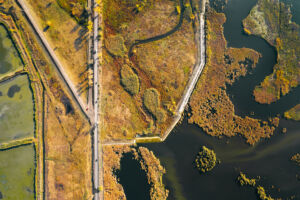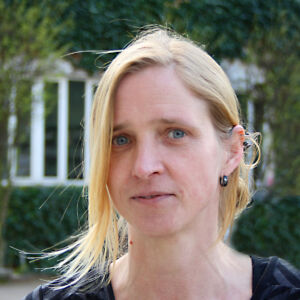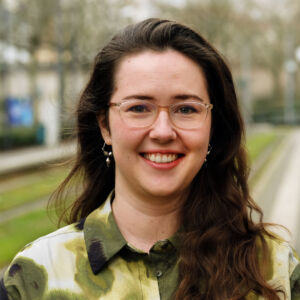Dr. Robert Lütkemeier
Head of the Research Unit Water and Land Use, Head of the Junior Research Group regulate Go to Profile
Climate change, competing interests regarding the use of these resources, and demographic and economic developments are increasing the complexity of these interactions. They also intensify uncertainties around the availability and quality of water and land resources. This is a problematic situation because the established forms of management are geared towards continuity and are overburdened by dynamic change processes such as land degradation and water pollution or extreme events such as droughts and floods.
Our research focuses on two research strands:
Extreme events such as droughts and floods result from the interaction of hydrological processes and land-use decisions, intensified by climate change and human environmental changes. We investigate the causes of these events in the water-land nexus to understand future developments and risks as well as impacts on ecosystems and society. We also investigate tipping points that arise from extreme events and gradual changes, and we deal with the question of how ecological disasters such as forest dieback and fish kills can be avoided.
Competing interests between the population, agriculture and industry lead to conflicts that are intensified by extremes such as droughts. However, such conflicts also offer opportunities to develop sustainable resource governance. In our research, we examine the causes, dynamics and potentials of these conflicts, as well as the values and practices of the actors involved. The aim is to develop transformative governance strategies in the water-land nexus together with partners from the field.
Head of the Social-Ecological Systems Hub
Go to ProfileHead of the Practices and Infrastructures Hub
Go to ProfileCoordinator for Academic Teaching and Qualification of Young Scientists
Go to ProfileHead of the Knowledge Processes and Transformations Hub
Go to ProfileMember of the Executive Board, Head of the Social-Ecological Systems Hub
Go to ProfileLinda Söller et al.
TRACTION Collective et al.
Katja Brinkmann, Ahmad Awad, Clara Hohmann
Katja Brinkmann, Markus Rauchecker, Diego A. Menestrey
Katja Brinkmann et al.
Katja Brinkmann et al.
Katja Brinkmann et al.
Katja Brinkmann, Dörte Ziegler
Katja Brinkmann, Dörte Ziegler
Katja Brinkmann et al.
Marlen Britsch et al.
Fanny Frick-Trzebitzky et al.
Fanny Frick-Trzebitzky et al.
Fanny Frick-Trzebitzky, Linda Söller
Lena Grieger et al.
Theodore B. Henry et al.
Clara Hohmann et al.
Heide Kerber, Michaela Rohrbach, Martina Winker
Anja Linstädter, Thomas Bringhenti, Stefan Liehr
Marius Mohr et al.
Tatiana Molano
Markus Rauchecker et al.
Engelbert Schramm et al.
Daniel Schuhmann-Hindenberg et al.
Daniel Schumann-Hindenberg et al.
Linda Söller
Sara T. R. Velasquez et al.
Marc Beckett, Sreya Prakash, Stefan Liehr
Katja Brinkmann
Katja Brinkmann et al.
Endre Dányi et al.
Bernd Eisenberg et al.
Kristiane Fehrs
Katja Geiβler et al.
Morgan Hauptfleisch et al.
Peter Hoffmann
Clara Hohmann et al.
David Kuhn, Dženeta Hodžić, Linda Söller
David Kuhn et al.
Stefan Liehr, Marc Beckett
Stefan Liehr, Marc Beckett, Baumgartner Annamirl
Robert Lütkemeier et al.
Ulrike Mausolf
Markus Rauchecker, Katja Brinkmann, Ahmad Awad
Markus Rauchecker, Katja Brinkmann, Ahmad Awad
Priyanka Sarkar, Robert Lütkemeier
Linda Söller et al.
Linda Söller, Dženeta Hodžić, Robert Lütkemeier
Linda Söller, Dženeta Hodžić, Robert Lütkemeier
Carolin Völker
Niels Blaum et al.
Katja Brinkmann et al.
Fanny Frick-Trzebitzky, Rossella Alba, Kristiane Fehrs
Fanny Frick-Trzebitzky, Robert Lütkemeier
Katja Irob et al.
Ronja Kraus et al.
Deike Lüdtke, Manjana Tausendfreund, Stefan Liehr
Robert Lütkemeier et al.
Sreya Prakash et al.
Sreya Prakash et al.
Markus Rauchecker, Alice Cimenti, Stefan Liehr
Britta Acksel, Dženeta Hodžić, Catharina Lüder
Ahmad Awad, Clara Hohmann, Katja Brinkmann
Hana Curak, Dženeta Hodžić
Lukas Drees et al.
Fanny Frick-Trzebitzky
Fanny Frick-Trzebitzky et al.
Dženeta Hodžić, Fanny Frick-Trzebitzky, Zoran Nakic
Ulan Kasymov et al.
Deike Lüdtke et al.
Deike Lüdtke et al.
Robert Lütkemeier, Linda Söller, Fanny Frick-Trzebitzky
Marion Mehring
Saket Pande et al.
Sreya Prakash et al.
Sreya Prakash et al.
Sreya Prakash et al.
Sreya Prakash et al.
Markus Rauchecker
Anika Tarne et al.
Martin Zimmermann, Felix Neu
Katja Brinkmann et al.
Katja Brinkmann, Stefan Liehr, Lena Bickel
Alice Cimenti, Manjana Tausendfreund
Lukas Drees, Robert Lütkemeier, Heide Kerber
James Ellison et al.
Fanny Frick-Trzebitzky et al.
Fanny Frick-Trzebitzky, Robert Lütkemeier
Diana Hummel
Ronja Kraus et al.
Stefan Liehr, Deike Lüdtke
Stefan Liehr, Robert Lütkemeier, Deike Lüdtke
Deike Lüdtke, Robert Lütkemeier
Deike Lüdtke et al.
Robert Lütkemeier et al.
Robert Lütkemeier et al.
Robert Lütkemeier, Meed Mbidzo, Stefan Liehr
Florian A. Männer et al.
Christina Plank et al.
Markus Rauchecker
Florian Dirk Schneider et al.
Martin Zimmermann et al.
Thomas Fickel, Robert Lütkemeier, Diana Hummel
Ronja Kraus et al.
Ronja Kraus et al.
Ronja Kraus, Ivonne Makando
Stefan Liehr, Nicola Schuldt-Baumgart
Denise Margaret S. Matias et al.
Marius Mohr et al.
Sina Battenberg et al.
Thomas Fickel et al.
Fanny Frick-Trzebitzky, Martin Zimmermann, Thomas Kluge
Diana Hummel, Marion Mehring
Stefan Liehr et al.
Robert Lütkemeier et al.
Robert Lütkemeier, Stefan Liehr
Marius Mohr et al.
Oliver Schulz et al.
Carolin Völker, Johanna Kramm
Thomas Bergmann et al.
Jenny Bischofberger, Evelyne Gab, Stefan Liehr
Willem Clercq et al.
Jutta Deffner, Peter Haase
Stefan Liehr, Jenny Bischofberger, Oliver Schulz
Stefan Liehr et al.
Stefan Liehr, Engelbert Schramm, Oliver Schulz
Stefan Liehr, Oliver Schulz
Robert Lütkemeier
Robert Lütkemeier, Johanna Kramm, Stefan Liehr
Robert Lütkemeier, Stefan Liehr
Robert Lütkemeier et al.
Marion Mehring et al.
Marion Mehring et al.
Diego A. Menestrey Schwieger et al.
Oliver Schulz et al.
Oliver Schulz, Stefan Liehr, Jörg Grossmann
Hannes Taubenböck et al.
Corinna Voll, Jenny Bischofberger
Carolin Völker, Oliver Schulz, Heide Kerber
Alyssa Weskamp, Stefan Liehr, Marius Mohr
Sarah Kampfl, Robert Lütkemeier, Stefan Liehr
Robert Lütkemeier et al.
Robert Lütkemeier et al.
Oliver Schulz et al.
Oliver Schulz, Stefan Liehr, Jörg Grossmann
Oliver Schulz et al.
Selina Baldauf et al.
Jenny Bischofberger et al.
Oliver Schulz
Oliver Schulz et al.
Jenny Bischofberger et al.
Robert Lütkemeier, Stefan Liehr
Barbara Birzle-Harder, Jutta Deffner, Peter Haase
Jörg Felmeden
Johanna Kramm et al.
Engelbert Schramm, Arash Davoudi
Engelbert Schramm, Karoline Kickler
Engelbert Schramm, Elnaz Sattary
Engelbert Schramm, Arash Davoudi
Thomas Kluge et al.
Thomas Kluge
Katja Brinkmann et al.














